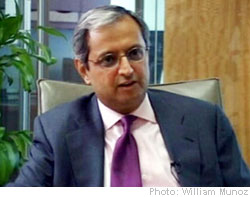 Vikram Pandit, chief executive of Citigroup (C), on Thursday blamed short sellers for company woes rather than the culture of greed, arrogance, and excessive risk taking which unfortunately, has and continues to permeate the entire financial industry ; an industry worth pointing out which almost took the entire financial system down.
Vikram Pandit, chief executive of Citigroup (C), on Thursday blamed short sellers for company woes rather than the culture of greed, arrogance, and excessive risk taking which unfortunately, has and continues to permeate the entire financial industry ; an industry worth pointing out which almost took the entire financial system down.
FT: “There were a number of instances post the Lehman Brothers’ collapse … where the markets were not really functioning in a rational way – they were frozen,” Pandit said. “There are ways that fear overtakes it and particularly that’s the tool that shortsellers need to make money.”
Pandits’s comments, made in testimony to the Congressional Oversight Panel, will certainly be disputed by analysts on the basis that short-sellers, who were blamed for intensifying market sell-offs in the fall 2008, before the practice was temporarily banned, in some cases were used as scapegoats for the real villains in the meltdown.
The reality is that during the financial crisis there was a legitimate reason as to why the financial stocks kept bleeding. In Citi’s case, despite Pandit’s zig-zaging, the NY-based company clearly had massive fundamental problems with its balance sheet ranging from a dubious quality of assets to excessive debt, and on and on. Before blaming one’s incompetence on short-sellers let’s keep in mind the critical role they played in identifying problems at Enron, Boston Market and other financial scandals over the years.
Pandit said Citi today is fundamentally different from the company he inherited when he became CEO two years ago. (C) was trading at $3.45 on Thursday, compared with a 52-wkh $5.43 in August.
- Bulenox: Get 45% to 91% OFF ... Use Discount Code: UNO
- Risk Our Money Not Yours | Get 50% to 90% OFF ... Use Discount Code: MMBVBKSM
Disclaimer: This page contains affiliate links. If you choose to make a purchase after clicking a link, we may receive a commission at no additional cost to you. Thank you for your support!


Leave a Reply